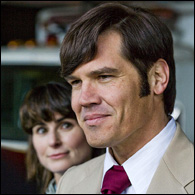

|
| home | movie reviews | features | sov horror | about | forum |
Q&A with Josh Brolin (Milk)
Josh Brolin has had as varied a career as one could imagine. The son of actor James Brolin, he made his debut in 1985's The Goonies -- a movie which instantly endeared him to Generation Xers everywhere. His profile rose and fell for the next two decades, through projects good and not so good. The last few years have leaned substantially towards the former, however, with memorable turns in Karen Moncrieff's The Dead Girl, Robert Rodriguez's Planet Terror, Ridley Scott's American Gangster, Oliver Stone's W., and 2007's Best Picture winner No Country for Old Men. He continues that streak this fall with Gus Van Sant's Milk, in which he portrays the title figure's eventual assassin Dan White. He recently spoke with the press about working with Van Sant, surviving in Hollywood, and the lingering psychological effects of playing the President of the United States. Question: There's some ambiguity about Dan White's sexuality in this film: you never answer the question, but there's at least a hint that he may be in the closet. How much of that played into your approach? Josh Brolin: That's one of those things that you can play, but you can't necessarily make the principle motivation of the character. I'm not going to go into it saying that the huge motivation here was that he was homophobic or that he was a latent homosexual. I don't want to do that unless I know that for sure. But you can pick up the possibility of that by the need to be liked, or the need to connect, or the need to be accepted by Harvey. That's why when Sean [Penn] and I did that scene in the lobby together, we brought a little more to it. The scene was written with us just meeting, I'm late for his birthday, I'm a little angry and resentful that he didn't vote on my bill for pay raises, I give him alcohol for his birthday, and that's the end. We felt there was an opportunity there to make it a little more absurd, a little more dangerous. So we did things during that scene where I'd look at him a little too long. Where I was a little more drunk, and I drank his birthday present. There was a moment where I hugged him and I wouldn't let him go that they didn't end up using. I thought that was more interesting, and that certainly lends itself to an ambiguous interpretation. But I think it's more about a guy who was a big fish in a small pond, who came to city hall without any real skills and with the pressures of the police force and the fire department wanting him to bring San Francisco back to what it was before, which is an impossibility. All of that pressure is on him and he didn't have the skills. He didn't have the wherewithal or the foresight to know that this was Harvey's time. This was a gay and lesbian movement. This was a hippie movement. It was going to reach a peak and then it would start to bleed into the mainstream, and then he would have his time. He didn't see that. He just got more and more frustrated: his wasn't a political mind. Q: How much research did you do into Dan White and his politics? JB: As much as I could. I met with some people who knew him, people who were concerned that we were going to treat him like a monster. And that's never my intention. We know he's a monster because of the act that he committed, but the more important question is why. You have to follow the humanity of this person and understand what drove him to do something like that. I did hear his confession tape, which was hugely revealing. He felt victimized, which I thought was pathetic, but also very human. The trial transcripts were less informative, actually. The confessional tape was the most revealing. Q: Was there any concern about how the community might respond to you while you were shooting? JB: I was worried about that in the beginning. I was staying above the Castro, in a friend's apartment, and I would go down to do my grocery shopping every day. San Francisco really embraced the making of this film -- very sweetly so -- but I was concerned that they were going to equate me with Dan White. In fact, it was the exact opposite. They were like, "Oh wow, you're playing Dan White! We're so happy this movie is being made!" So I stopped worrying. And even if I hadn't, the story needs to be told. I cried when I read the script, and I cried after I watched the 1984 documentary with my daughter. Then I called Gus [Van Sant] and said, "Whatever you want man." (*smiles*) Then he told me how much they'd be paying me. Q: Is there a difference between the way you approach real-life figures like Dan White and George Bush, and the way you would a fictitious character? JB: Not emotionally, but in trying to find a hook into a character, you have a little more to draw on. Once I've found the character's hook, then I'm OK. It's the finding it that's tough. With real-life characters, you have video and material like that to help. Especially with Bush: there's just so much out there. That's one of the reasons I almost didn't do it. You can see him on CNN to compare. If anybody was going to get slammed on that film, it would have been me. Oliver [Stone] kept saying, "I'm going to take all the heat on this." And I just said, "No you're not. It's me for sure. I'm playing a guy who went from a 90% approval rating to a 23% approval rating. I guarantee you it's going to be me." Luckily, people seem to be fairly well-disposed towards the performance. It's funny, I never believed when actors talked about how hard it was to let go of their character. I never bought it. Ever. But with W., it was so tough to find the character and hone it -- we went through thirty-seven years of his life, so it was like playing seven or eight different characters. And it took a little while to get rid of it. The last remnants of it came out whenever I would tell a joke. It would always come out like this (*affects a Texas accent and a W-esque grin*) and I'd have to stop the joke. Q: You've had a very successful couple of years creatively. Was there a turning point when you started to evaluate scripts differently, or did good scripts just start coming your way? JB: I've always had the same approach: I just want to work with great filmmakers. That's it. I got to a point three or four years ago when I was willing not to work anymore rather than work with filmmakers who weren't on that level. That's when I got into day trading and real estate. And when I say that, I have to stress that it's a very personal decision. I don't want to insult anyone out there who makes choices in order to earn a living. One percent of the people in my union make a living dong what we do. So we're all pretty happy getting an episode of 21 Jump Street or whatever. I've been extremely happy for twenty-five years just to be able to make a living off of acting. Extremely happy. But for me, it got to a point when I was making certain movies -- less than stellar movies -- and I would wake up with the flu. I just didn't feel good. I was fortunate enough to find something like day trading, which let me make some money and allowed me to be a little choosier about my roles. So I said, "I need to go into it with the right intentions and the right people." It might not turn out well, but that's OK as long as I know I'm going into it for the right reasons. And things changed at that point. I don't know why, I don't know how, I don't know if it was me or if it was just happenstance. I don't know. It's just so satisfying to work with great filmmakers, to work with people like Gus or the Coens. It doesn't matter if you only have a supporting part, just a couple of scenes. It's the experience. You look at the movie afterwards and you think, "Wow that was great." I had that feeling for the first time during Flirting with Disaster, and I never forgot it. Q: How much latitude did Gus Van Sant give you in this role? JB: A huge amount. He tweaks. He does exactly what Oliver does. Exactly what the Coens do. They're brilliant with casting, and they basically say, "We're hiring you because we think you can do the job, so you do the work." They're not going to do the work for you; they have a lot of work to do themselves. Then once you're in it, they make little adjustments. "What about doing this or doing that or doing that?" They're tweakers. Q: Do you ever talk to other actors for advice? Your father, maybe, or friends in the business? JB: No. Everyone's looking for a job, man. That's what no one understands outside of Hollywood. Even if you have a famous father or this advantage or that advantage, everyone's still looking for a job. My father, everyone. You have the fluctuations of being in the business. Right now is a high. I know it'll turn into something else later. Maybe I'll be the guy or maybe I'll be the guy trying to get a silly sitcom off the ground. What's been great about my career is that I've been able to go through some ups and downs. It makes you really grateful for times like these: I'm working with people who I feel akin to. People who don't have a lot of ego, people who aren't concerned about their status. People who just want to tell a great story. I love being around that. Q: What do you hope people will take away from this film? JB: I'm not an advocate of pushing your ideas onto other people. I am an advocate of respecting other people's opinions. I don't like any discrimination towards anyone. You know, the Prop 8 thing has come up and the Mormon thing has come up. Some opponents of Prop 8 may look at Mormons and say, "I don't understand." And some Mormons may look back and say, "I don't understand." I hope people see this film as an argument for the allowance of diversity and the acceptance of people who may be different from themselves. Article published 12.07.2008. Read Rob Vaux's review of Milk.
|


|
| home | movie reviews | features | sov horror | about | forum |
| This site was previously at flipsidemovies.com from 2000 to 2008. |
|
contact | copyright | privacy | links | sitemap
Flipside Movie Emporium (FlipsideArchive.com)
|